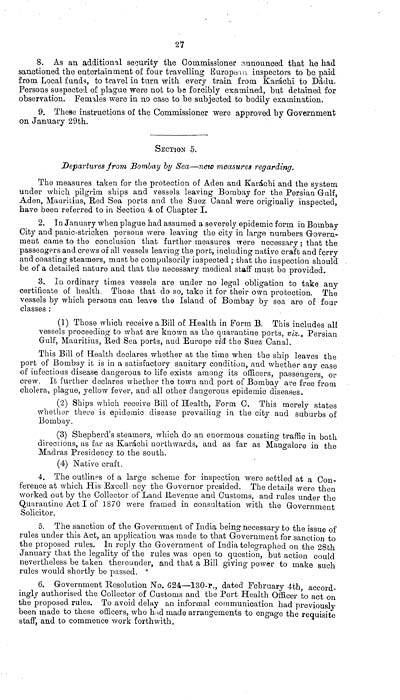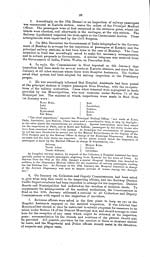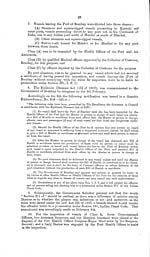Medicine - Disease > Account of plague administration in the Bombay Presidency from September 1896 till May 1897
(39) Page 27
Download files
Individual page:
Thumbnail gallery: Grid view | List view

27
8. As an additional security the Commissioner announced that he had
sanctioned the entertainment of four travelling European inspectors to be paid
from Local funds, to travel in turn with every train from Karchi to Ddu.
Persons suspected of plague were not to be forcibly examined, but detained for
observation. Females were in no case to be subjected to bodily examination.
9. These instructions of the Commissioner were approved by Government
on January 29th.
SECTION 5.
Departures from Bombay by Sea-new measures regarding.
The measures taken for the protection of Aden and Karchi and the system
under which pilgrim ships and vessels leaving Bombay for the Persian Gulf,
Aden, Mauritius, Red Sea ports and the Suez Canal were originally inspected,
have been referred to in Section 4 of Chapter I.
2. In January when plague had assumed a severely epidemic form in Bombay
City and panic-stricken persons were leaving the city in large numbers Govern-
ment came to the conclusion that further measures were necessary; that the
passengers and crews of all vessels leaving the port, including native craft and ferry
and coasting steamers, must be compulsorily inspected; that the inspection should
be of a detailed nature and that the necessary medical staff must be provided.
3. In ordinary times vessels are under no legal obligation to take any
certificate of health. Those that do so, take it for their own protection. The
vessels by which persons can leave the Island of Bombay by sea are of four
classes:
(1) Those which receive a Bill of Health in Form B. This includes all
vessels proceeding to what are known as the quarantine ports, viz., Persian
Gulf, Mauritius, Red Sea ports, and Europe vi the Suez Canal.
This Bill of Health declares whether at the time when the ship leaves the
port of Bombay it is in a satisfactory sanitary condition, and whether any case
of infectious disease dangerous to life exists among its officers, passengers, or
crew. It further declares whether the town and port of Bombay are free from
cholera, plague, yellow fever, and all other dangerous epidemic diseases.
(2) Ships which receive Bill of Health, Form C. This merely states
whether there is epidemic disease prevailing in the city and suburbs of
Bombay.
(3) Shepherd's steamers, which do an enormous coasting traffic in both
directions, as far as Karchi northwards, and as far as Mangalore in the
Madras Presidency to the south.
(4) Native craft.
4. The outlines of a large scheme for inspection were settled at a Con-
ference at which His Excellency the Governor presided. The details were then
worked out by the Collector of Land Revenue and Customs, and rules under the
Quarantine Act I of 1870 were framed in consultation with the Government
Solicitor.
5. The sanction of the Government of India being necessary to the issue of
rules under this Act, an application was made to that Government for sanction to
the proposed rules. In reply the Government of India telegraphed on the 28th
January that the legality of the rules was open to question, but action could
nevertheless be taken thereunder, and that a Bill giving power to make such
rules would shortly be passed.
6. Government Resolution No. 624-130-P., dated February 4th, accord-
ingly authorised the Collector of Customs and the Port Health Officer to act on
the proposed rules. To avoid delay an informal communication had previously
been made to these officers, who had made arrangements to engage the requisite
staff, and to commence work forthwith.
Set display mode to: Large image | Zoom image | Transcription
Images and transcriptions on this page, including medium image downloads, may be used under the Creative Commons Attribution 4.0 International Licence unless otherwise stated. ![]()
| India Papers > Medicine - Disease > Account of plague administration in the Bombay Presidency from September 1896 till May 1897 > (39) Page 27 |
|---|
| Permanent URL | https://digital.nls.uk/74517088 |
|---|




